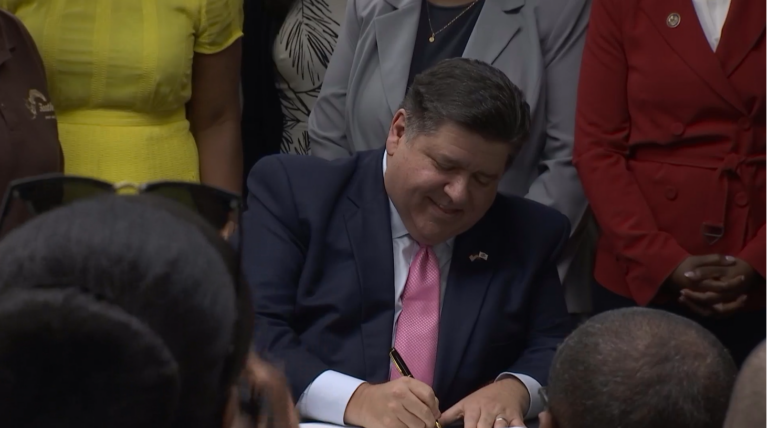SPRINGFIELD – Gov. JB Pritzker signed legislation Wednesday that seeks to effectively end homelessness in Illinois by marshalling the resources of multiple agencies into one effort.
House Bill 2831 codifies an executive order Pritzker signed in 2021 that established the Illinois Interagency Task Force on Homelessness and the Community Advisory Council on Homelessness. It centralizes programs across 17 state departments and agencies to develop and implement a comprehensive plan to combat homelessness.
At a bill-signing ceremony at Featherfist, a homeless services organization in Chicago, Pritzker said the goal of the initiative is to bring homelessness in Illinois to “functional zero.”
“For those who don’t know and who may be listening, it’s a measurable metric of success that reduces homelessness to something that’s brief and rare and nonrecurring,” Pritzker said.
The Chicago Coalition for the Homeless estimates that more than 100,000 people in Illinois experienced homelessness for all or part of 2020. That included people who were temporarily staying in someone else’s home, or “doubling up.”
Christine Haley, the state’s current chief homelessness officer and chair of the interagency task force, said Black people and other people of color are disproportionately affected by homelessness.
“We stand here in one of the few Black-led homeless services organizations in our state. And as we stand here, we know that this housing crisis before us is rooted in housing injustice, is rooted in segregation, is rooted in racism,” she said. “We know this because in our city of Chicago, where now less than a third of its residents are Black, 73 percent of individuals and 90 percent of children and their parents who are experiencing homelessness are Black.”
State Rep. Lindsey LaPointe, D-Chicago, who was the lead sponsor of the bill in the House, said that on any given night, an estimated 4,500 people in Illinois are without shelter and the average wait time for someone to receive housing services is 802 days. She also noted that in Fiscal Year 2022, 9,800 people were turned away from emergency shelters.
“Ending homelessness and ensuring every neighbor has access to shelter and supportive services has long been possible in Illinois and across the nation, but we haven’t had the collective political, economic – and I say this with love – bureaucratic will to make it happen until now,” she said.
In his State of the State address in February, Pritzker highlighted the state’s “Home Illinois” plan, which calls for increased spending for homelessness prevention, crisis response, housing units, and staffing.
On Wednesday, he noted that the budget lawmakers eventually passed this year includes more than $350 million for homeless services, an $85.3 million increase over last year.
That includes, among other things, $50 million in rapid rehousing services for 2,000 households; $40 million to develop more than 90 Permanent Supportive Housing units that provide long-term rental assistance and case management; and $37 million in Emergency Shelter capital funds to create more than 460 non congregate shelter units.
“No stone is going to be unturned in this endeavor,” Pritzker said.

